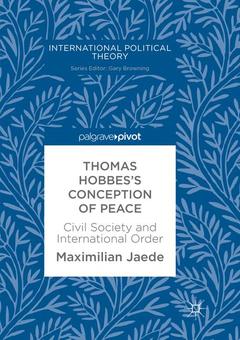Thomas Hobbes's Conception of Peace, 1st ed. 2018 Civil Society and International Order International Political Theory Series
Auteur : Jaede Maximilian

This book explores Hobbes?s ideas about the internal pacification of states, the prospect of a peaceful international order, and the connections between civil and international peace. It questions the notion of a negative Hobbesian peace, which is based on the mere suppression of violence, and emphasises his positive vision of everlasting peace in a well-governed commonwealth. The book also highlights Hobbes?s ideas about international coexistence and cooperation, which he considers integral to good government. In examining Hobbes?s conception of peace, it provides a fresh perspective on his international political thought. The findings also have wider implications for the ways in which we think about Hobbes?s relationship to the realist and liberal traditions of international thought, and will appeal to students and scholars of political theory and international relations.
1. Introduction.- 2. Peace and society.- 3. Peace, justice and law.- 4. Peace and defence.- 5. Conclusion.
Maximilian Jaede is Course Organiser at the Centre for Open Learning, University of Edinburgh, UK. Previously, he was a research fellow at the Edinburgh Institute for Advanced Studies in the Humanities and taught political theory at the University of Stirling, UK.
Date de parution : 03-2018
Ouvrage de 105 p.
14.8x21 cm
Thème de Thomas Hobbes's Conception of Peace :
Mots-clés :
Thomas Hobbes; Hobbe's conception of peace; Civil society and Hobbes; International order and Hobbes; International Political Theory; pacification of states; civil and international peace; Hobbesian peace; Hobbes and international coexistence; Hobbes and international cooperation; realism and international relations; liberalism and international relations; international relations theory; Hobbes’s international political thought; Hobbes and peace studies; Good government; Sovereignty and international order; Civil and international peace; peace and justice; peace and society



